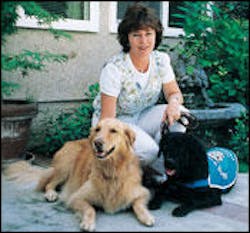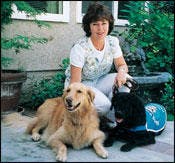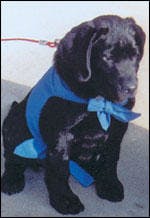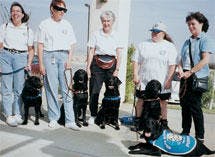Puppy love
This California hygienist found the perfect cure for empty nest syndrome: raising guide dog puppies.
by Cat Zermatt Schmidt, RDH
When her two daughters left home for college, Ruth Carey confronted that dreaded disease familiar to every parent: empty nest syndrome. Her home became as silent as a tomb without her teenagers' endearing ruckus and chaos. In order to save her sanity, Carey knew she had to find an outlet. Through the years, she'd always volunteered within the dental field — at sealant clinics, healthcare lectures, and oral hygiene talks in grade schools. However, she felt pulled in a new direction this time. Something other than dental-related volunteerism knocked — or rather, scratched — at her door. On the advice of a friend, Carey called Guide Dogs of the Desert in Palm Springs, Calif., to volunteer as a "puppy raiser." Carey loves dogs, and was thrilled to raise one that would spend its life as friend and helpmate to a grateful person. It seemed the perfect blending of her love of animals and her desire to help others.
She was eager to get started. Carey spent hours readying her home for her first puppy inspection; even her plants needed to pass the safety test. For example, Oleanders and other plants are toxic to pets and are obviously forbidden. Little puppies are naturally inquisitive, so the home must be free of all tantalizing but dangerous objects.
Carey found that introducing a puppy into a new environment is a lot like bringing in small children. Dangers lurk everywhere, and trained inspectors are on the lookout for hazards, such as holes in the fence where a dog might escape. Thankfully, foster homes needn't be Norman Rockwell perfect; in fact, they need not be "homes" at all. Condos or city apartments work well, too, as long as there's room for the puppy's crate and a place for him to relieve himself. "Pooper Scoopers" have greatly increased the range of possible foster homes, as parks, sidewalks, or even gutters can become socially acceptable doggie "toilets."
Guide Dogs of the Desert does not require their puppy trainers to become licensed or take any special classes. Someone who wants to raise puppies needs only the desire to help. "Actually, you don't have to be certified, you just have to be willing and able," explains Carey. She notes, however, that each individual guide dog organization has its own rules and requirements.
The day came when the inspector arrived with a little black tornado named Lexus. He was a Labrador Retriever, all ears and paws with a crooked tail that looked like a check mark. After a painstaking tour, the Carey home passed the test. The inspector handed her the leash; her husband took one look at the dog and said, "Well, honey, I guess you now have that little black Lexus you've always wanted. Looks like I'm off the hook!"
As a surrogate mom to guide puppies, Carey is always looking for different and interesting situations for her charges. With a varied repertoire of experiences, the puppy becomes better socialized and can handle just about anything its human companion may encounter. Carey is never sure in what type of home setting her puppy will be placed, so it's important that the dogs are comfortable in a variety of venues. Laws allow guide dogs and guide-dogs-in-training in every public arena except the zoo.
As the puppy learns new environments, so also will people learn about guide dogs and understand their presence in places where dogs are usually not permitted. "The education of people becomes a very important aspect of puppy socialization," says Carey.
A run-in with a waiter at a diner taught her that right sometimes needs might to overcome certain obstacles. Before taking their lunch order, their waiter insisted the dog leave. Carey, attempting to diffuse the situation, explained the laws governing guide dogs in training. Unfortunately, her words fell on deaf ears. Just when she was about to give up, a "biker dude" in full leather regalia sauntered over. In a no-nonsense manner, the biker informed the waiter that by law the puppy could stay, and that the waiter had better serve Carey and her family because he just ran out of options. Still miffed, the waiter wisely obliged. In a gratifying about-face, the waiter later informed the table that he'd phoned the owner of the restaurant, who assured him the dog was allowed on the premises.
People, however, aren't the only ones who need lessons in accepting behavior. Carey raised one puppy, Hana, who was having difficulty around small children. Sometimes, the animal seemed withdrawn around kids; other times her attitude was almost aggressive. She even barked at a child during a restaurant outing. Carey knew this behavior needed to change because it's not acceptable for guide dogs to have problems with other humans, especially small kids.
The solution to this worrisome problem seemed heaven-sent. Carey's husband, Jack, is a deputy sheriff with the Los Angeles County Sheriff's Department. Every year the department holds a Christmas party for families with foster children who are medically or physically compromised. Called "999 for Kids," the charity event provides gifts, entertainment, and even a visit from St. Nick to disabled foster children. The benefit is aptly named because the radio code "999" means an officer needs assistance; all officers respond, without fail. Carey decided this outing would be a perfect time for Hana to gain exposure to children of all ages, sizes, shapes, and disabilities, as well as expose her to all sorts of mobile medical equipment.
As Carey and Hana walked up to the crowd of nearly 2,000, a small boy whizzed by on his wheelchair. Hana barked loudly at him. The kid stopped and asked Carey, "What's the matter with that dog?" She explained what was wrong with Hana and wondered if the boy might assist her in training the dog. His eyes lit up and a large grin erupted on his face. He said his name was Trevor, and he'd be glad to help. Sometimes the biggest gift you can give someone is to ask for his or her assistance.
First, Carey walked Hana around Trevor as he sat stationary in his chair. Gradually, the boy added movement to his part in the experiment, very slight at first, then increasing in intensity. Soon, Trevor was zooming around and popping wheelies. Some of his foster brothers — one on crutches —came over to "help." Hana performed well. Once the initial shock wore off, the puppy calmed down and seemed interested rather than frightened by the activity surrounding her. Carey claims that after meeting Trevor and his brothers, Hana never barked at another child.
As they were leaving the festivities, Carey and Hana ran into three little sisters, all foster children. They noticed the dog and Carey's sunglasses, so they asked if she was blind and if Hana was her guide dog. Carey explained that no, she wasn't blind; she was the "foster mother" to the puppy. One of the little girls bent down and patted Hana on the head. She whispered into the puppy's ear, "I bet you miss your Mommy. You know she really loves you, but she just can't take care of you right now."
Guide Dogs of the Desert does not require formal dog training until the puppy is well over a year old. Then, the animal returns to the main kennel, where professionals teach them the necessary companion skills. By starting out as puppies in foster homes, guide dogs learn to socialize and behave in various settings in the human world. The puppies soon understand the basics. They must stay close to their masters when on "tie down," which can be a leash. Carey usually tethers her puppies to the kitchen table when she's cooking or working in the kitchen. That way, they know they must stay close to a human, their future master, when on the leash.
Puppies also must distinguish between their work time and play time. Work time starts when the owner puts on the dog's vest, a drape that tells the seeing world that this dog is more than a pet — he's a working guide. The puppy must stay focused during this time. If Carey senses her charge is tired, or having a bad day, she takes off the vest and tries again later. "Puppy raising is just like preschool for a toddler," she says. Certain basic rules need to be enforced, but only according to the puppy's temperament at the moment. Some days it's just not feasible to take the puppy shopping, for example.
Most importantly, all puppy caregivers teach the spoken command "get busy." When dogs "get busy," they do their business, or relieve themselves. Future owners will use this command constantly, anytime they're preparing to enter a building or store for a long period of time. It's vital for the guide dog to have bladder control for an owner's long doctor visits, trips to the store, and other functions. A companion dog can't interrupt his owner's night at the symphony to relieve himself.
Graduation day
Eventually, all puppies reach the age where they're ready for formal training and to meet their future owners. Graduation day at Guide Dogs of the Desert is a bittersweet event. "What makes puppy raising all worthwhile is the day when your puppy goes off to be part of a working team," says Carey.
At graduation, the grown puppies meet their new blind masters, and the next group of foster parents receive their new puppies. This past April, graduation took place on Easter; the organization presented all of the tiny new puppies in Easter baskets with bright pastel bows around their necks.
At nearly every graduation ceremony, Robert Delafield sings the song, "I See Through the Eyes of My Friend," by Irwin Rabinsky. The words are moving and heart-wrenching, and seldom leaves a dry eye in the house.
There's laughter, too. When a blind woman learned her future companion, a standard poodle, had fur similar in color to her hair, she insisted on having her hair styled to match the dog. The crowd roared with laughter and applause as the two companions with fluffy white "perms" greeted each other on the podium.
Before any blind person receives such a precious gift, he or she must pass a rigorous interview process. All candidates must show that they can physically care for the dogs; they must submit videotapes of themselves navigating their hometowns or neighborhoods with a white cane. Mobility is a strict requirement.
"The dog is just another tool," Carey explains. "He can be a pair of eyes, but he doesn't know where the store is, or even in which aisle the cereal is located."
That's why it's important for future owners to already know the location of their favorite restaurant or coffee house. The dog assists and leads with his eyes, but he can't direct with his mind. That task is up to the owner.
Carey says even though it can be difficult to give up a puppy after living with him for a year and a half, the payoff is extremely rewarding. Her joy comes from knowing the puppy will be placed in a situation where he's greatly needed — and loved.
Author's note: For more information on guide dogs or how to become a puppy raiser, please contact Guide Dogs of the Desert at 760-329-6257, www.guidedogsofthedesert.org, or the American Foundation for the Blind at (800) 232-5463, www.afb.org.
Cat Zermatt Schmidt, RDH, is a freelance writer living in San Jose, CA. Her book, "Not Just the Cleaning Lady: A Hygienist's Guide to Survival" is available from PennWell Publishing at 1-800-752-9764. You can email her at [email protected].
Carey's 'other life'
Sometimes it takes a life-altering event to shake us free from comfortable patterns and propel us forward. Ruth Carey, a former dental assistant with a home economics degree, was cozily ensconced in family life. Her wake-up call came one day when a policeman knocked on her door and informed her of an accident that had nearly taken her husband's life. Her domestic idyl disrupted, Carey embarked on a nightmarish "what if" journey. What if she suddenly had to support their two children? What if she were left with the mortgage payment and other bills? What if her husband's life insurance and pension weren't enough to see them through?
Carey's decision to go back to school and study dental hygiene was an obvious one. Hygiene offered what few professions do: complete job security, a flexible schedule, and an excellent salary. Those significant "RDH" letters after her name assured Carey that she could take care of her family should her husband be disabled or killed in the line of duty.
Thankfully, her husband, Jack, made a full recovery from the accident and soon returned to work at the sheriff's department. Carey, however, continued her studies. She loved the challenge and — like many of us — gained tons of confidence as her knowledge and expertise increased.
Her husband's profession meshed nicely with Carey's on the day of her California state boards. Carey was supposed to meet her patient at his work site, a gas station in a seedy area of town. The patient was a no-show. Fueled by the determination peculiar to hygiene students about to take their boards, Carey, with husband in tow, set off for a dilapidated apartment building a few blocks away. Jack banged on the door with an authoritative "police knock."
Her patient appeared at the door, rubbing his eyes and protesting that he was too tired to come. Officer Jack Carey refused to take "no" for an answer. With a little friendly persuasion, he ushered the patient into his clothes and out the door. After feeding him a nice, big breakfast and assuring him he would make out financially on the deal, her patient proved much more willing. He made more money that day at the clinic substituting for other no-shows than he would have pumping a week's worth of gas.
Carey sailed through her boards, and then took a part-time position so she could be home for her children.
Fourteen years later, she's still with the same dentist. He respects hygienists as professionals, Carey reports, and often seeks her opinion on patients. That level of respect exceeds the routine of most offices; Carey considers her undying loyalty to one practice as the dentist's reward for treating his staff as fellow colleagues rather than paid employees.
Carey puts the doctor's attitude in perspective. "When we were getting new furniture, the hygiene room was the first to get a new chair instead of the last." Smart dentist. He probably knows that half of his restorative work comes from that room.
Doggie don'ts
Guide dogs are considered to be "on duty" when wearing their harness. It's natural for most people to want to stop and pet a guide dog, but this will distract the dog from the job and jeopardize the owner's safety. Other facts to remember:
- Do not offer food or treats to a guide dog. This can be disruptive. The handlers also carefully monitor their guide dogs' diet to ensure good health and performance.
- Calling out the dog's name or making distracting noises can break a guide dog's concentration and ability to work. Guide dogs are friendly and they will want to respond to the attention you are giving them, but please remember they are working as a blind person's eyes.
- A person using a guide dog wants to be treated normally. If you want to offer assistance, simply ask, "May I help you?" If the response is "yes," approach the person from the right side and offer your left arm for assistance. Don't take hold of the guide dog's harness or leash; this will confuse and startle both the individual and the dog.



